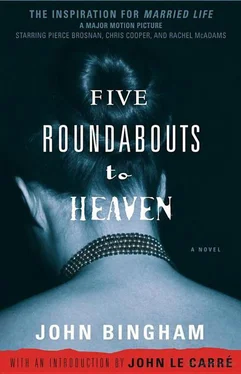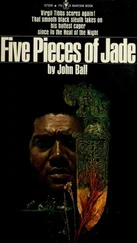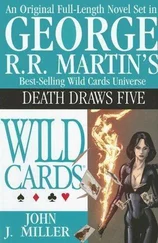John Bingham - Five Roundabouts to Heaven
Здесь есть возможность читать онлайн «John Bingham - Five Roundabouts to Heaven» весь текст электронной книги совершенно бесплатно (целиком полную версию без сокращений). В некоторых случаях можно слушать аудио, скачать через торрент в формате fb2 и присутствует краткое содержание. Жанр: Криминальный детектив, на английском языке. Описание произведения, (предисловие) а так же отзывы посетителей доступны на портале библиотеки ЛибКат.
- Название:Five Roundabouts to Heaven
- Автор:
- Жанр:
- Год:неизвестен
- ISBN:нет данных
- Рейтинг книги:4 / 5. Голосов: 1
-
Избранное:Добавить в избранное
- Отзывы:
-
Ваша оценка:
- 80
- 1
- 2
- 3
- 4
- 5
Five Roundabouts to Heaven: краткое содержание, описание и аннотация
Предлагаем к чтению аннотацию, описание, краткое содержание или предисловие (зависит от того, что написал сам автор книги «Five Roundabouts to Heaven»). Если вы не нашли необходимую информацию о книге — напишите в комментариях, мы постараемся отыскать её.
Five Roundabouts to Heaven — читать онлайн бесплатно полную книгу (весь текст) целиком
Ниже представлен текст книги, разбитый по страницам. Система сохранения места последней прочитанной страницы, позволяет с удобством читать онлайн бесплатно книгу «Five Roundabouts to Heaven», без необходимости каждый раз заново искать на чём Вы остановились. Поставьте закладку, и сможете в любой момент перейти на страницу, на которой закончили чтение.
Интервал:
Закладка:
It was a mince pie. Under the mince pie was an envelope addressed to him in Beatrice’s handwriting. On the envelope she had written: “Eat the pie, and read the letter.”
Bartels ate the pie. It was freshly made and crumbly. He knelt by the fire and opened the letter. The slight noise caused Beatrice to stir. She murmured his name sleepily.
“I’m back,” he replied softly.
She said something he could not catch, and turned over on her side and fell asleep again. He opened out the letter and read:
Darling Barty,
The beginning of the year is the time for other new beginnings. I know I have often been other than that which you wanted in your heart, though you have never said so. But I have done my best for you, darling. I will try to be better still. You have made me very happy over the years, and I want you to know how I appreciate it. I’ve made some more pies. Hope you liked this one!
Your own Beatrice.
He folded the letter and put it back in its envelope, and placed the envelope on the mantelpiece. He thought: Tomorrow evening I must go out. I can’t stay at home. If I stay at home I shall weaken. I must make some kind of excuse. I must get out tomorrow evening.
He turned the fire out and climbed into bed, and drew the sheets up to his chin and lay staring into the darkness. All his movements had been slow and noiseless, but the slight creak of the bed disturbed Beatrice.
She thrust her hand through the bedclothes, and out of her bed, and fumbled for Bartels’ hand. She found, not his hand, but his forearm, which seemed to be sufficient, for she sighed, as if with content, and dropped off to sleep again.
Bartels lay still, rigid, as the old turmoil of fear and pain and confusion gripped his stomach, and spread up his body to his throat. Then the pain and the fears dispersed, and only the confusion remained, and withdrew to his brain whence it had originated, and remained there a while, circulating round and round and round.
He kept it there as long as he could, fighting against certainty, because so long as there was confusion there was no decision, and so long as there was no decision there was no action, and without action there was safety.
But the uncertainty dispersed, too, in the end, as he knew it would.
So that he had to face the truth. It was not as though she were awake and play-acting. She had been three parts asleep. It had been an instinctive, almost subconscious action. The movement of the hand, with its groping, fumbling action, had wiped out the memory of the imaginary argument with the police constable. It had removed all the comfortable hopes.
He was not even back where he was. It was worse. There was no escape now, no more reasons for delay, no excuses which the hand of Beatrice, reaching out for him in the darkness, had not placed far beyond his reach.
I do need you: that’s what the hand had said. I may seem tough and self-reliant, and competent, but I’m not. I’m glad when you come back. I may not love you as you would like to be loved, but I need you. I’m glad when you return, because I don’t like being left alone. Fundamentally, I’m unhappy and unsure when I’m alone. Always come back to me. I do my best, I can’t do more, so don’t ever leave me. I would be so lonely, so frightfully lonely inside me, and so cold.
Bartels stared up into the darkness, his wrist gripped by the hand of Beatrice, fighting the old hopeless forlorn fight against the waves of pity.
Once, he tried, with infinite care, to disengage himself, but Beatrice sensed his intentions through her sleep, and tightened her grip. So he continued to lie on his back, while the certainty of what he must do grew stronger in his mind.
Because it was a cold night, the hand which gripped his wrist grew cold as the hand of a dead woman, or the hand of a woman to whom death had now come very close, even though there were, in fact, some days to go before 26 February.
Chapter 9
Two days later, travelling by a very early train, Bartels went to Manchester, as he had planned. In the evening, he sat in the writing room of his hotel. He felt cold, tired, and dispirited. The room was curiously named, because there were no pens, no writing paper, no blotting paper, and the inkwells were dry. But there were a few shoddy desks, and if you asked, they would reluctantly give you a few cheap sheets of headed notepaper at the reception desk.
There was a smouldering fire in the grate, but in spite of the fire the room was chilly, and a raw wind hammered periodically at the windows.
Round the grate sat three other commercial travellers. Bartels, trying to compose a letter to Beatrice, was distracted by their conversation.
Two of the men were in their thirties, thin, sharp-featured, red-faced fellows. The third was about fifty, a pale-faced man with a bald head and signs of exophthalmic goitre. Their talk ranged from world politics and the atom bomb to the current trade position.
Later, one of the men dropped his voice and began to talk about somebody called Fred with whom the three had been drinking earlier.
Fred, it appeared, was unfaithful to his wife, and he was regarded with amused admiration by the three before the fire. They related the various excuses he made to his wife, and laughed at his astuteness. Fred was a bit of a dog.
Bartels wondered why they bothered to lower their voices, since every word was audible to him. He also wondered why they thought Fred was so clever.
Fred wasn’t clever. Anyone with half a brain could deceive his wife, provided his wife was a normal, trusting individual. What was clever about pulling the wool over the eyes of somebody who trusted you? What’s so frightfully bloody clever about that? thought Bartels irritably. Children can do it. Even dogs.
He felt like throwing down his pen and shouting: “What do you oafs know about the inner subtleties of deception, of the deceiver who suffers more than the deceived? You clods! You sit here, crouched round the fire, smirking and leering, and what do you know of the pain of the imagination? You, who snigger like smutty-minded schoolboys, what right have you to gabble about infidelity?”
He pictured the look on their faces as they swung round at his words. Indignation at the insults, first, then a strained look as they tried to puzzle it all out, and then, of course, the reproaches:
“Excuse me, old man; but this happens to be a private conversation.”
“No need to be insulting, old man.”
“Who are you, anyway, to come butting in?”
He picked up his pen, and began to write, trying so to concentrate on his thoughts as to exclude the talk around the fire.
Dearest Beatrice, he wrote, but above the rattle of the window-panes, he heard the fat man’s wheezy voice:
“So Fred says without a second’s hesitation, “All right, dear,” he says, “if you don’t believe I stayed there, ring ’em up and ask ’em, write to ’em, do what you like, dear, if you don’t believe me,” and then the three pips goes and he cuts off with a quick goodbye. Of course, he knew she wouldn’t have the nerve.”
A louder gust of wind rattled the windows and drowned the rest. Bartels gazed at the notepaper. Dearest Beatrice. The lout Fred was a fool; otherwise his wife would not be suspicious. You can deceive your wife for years and years, thought Bartels drearily, if you’re not a boorish, ham-fisted clot like Fred. There must have been a time when Fred’s wife was as trusting as Beatrice.
Bartels sighed.
He crumpled the sheet of notepaper up because he had smudged it, and took another, and wrote a brief letter to Beatrice saying that he hoped to be back on the next day but one.
Then he went up the narrow, winding staircase to his room at the top of the hotel. The room was cheerless and sordid, a measure, he supposed, of his own lack of success as a wine salesman. He wondered why they couldn’t take him off the road, give him a job in the office. He’d be all right in the office. He was no good on the road. Hadn’t got the aggressiveness, the smooth talk, the self-confidence.
Читать дальшеИнтервал:
Закладка:
Похожие книги на «Five Roundabouts to Heaven»
Представляем Вашему вниманию похожие книги на «Five Roundabouts to Heaven» списком для выбора. Мы отобрали схожую по названию и смыслу литературу в надежде предоставить читателям больше вариантов отыскать новые, интересные, ещё непрочитанные произведения.
Обсуждение, отзывы о книге «Five Roundabouts to Heaven» и просто собственные мнения читателей. Оставьте ваши комментарии, напишите, что Вы думаете о произведении, его смысле или главных героях. Укажите что конкретно понравилось, а что нет, и почему Вы так считаете.












